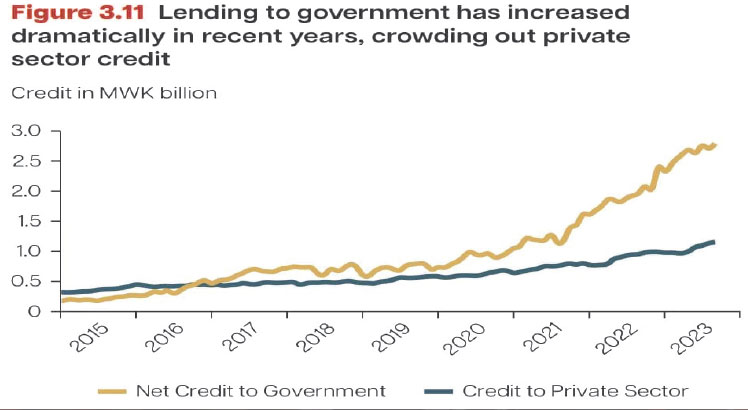Government dominates loans, hits k3.3tn
Commercial banks continue to extend more credit to government compared to the private sector, with data showing that credit to government increased to K3.3 trillion in November 2023 alone.
Despite domestic credit to government and the private sector increasing by K855.2 billion to K5.2 trillion during the review period, firms are still facing difficulties in accessing finance, citing high interest rates and repayment risks, according to the November 2023 Reserve Bank of Malawi (RBM) Monthly Economic Report.
Reads the report part: “The annual growth of private sector credit accelerated to 22.6 percent in November 2023 from 19.1 percent in October 2023, but was lower than 26.5 percent during the corresponding month in 2022.

“Foreign currency denominated loans, mortgages and individual household loans increased by K63.2 billion, K14.4 billion and K1.2 billion to K199.3 billion, K93.5 billion, and K493.7 billion in the review month, respectively.”
The report said this was offset by a decrease in commercial and industrial loans by K24.3 billion to K482.3 billion in November 2023.
Much of the private sector credit expansions were recorded in agriculture, forestry, fishing and hunting at K21 billion, wholesale and retail trade at K18 billion, restaurants and hotels at K8.2 billion, financial services at K4.2 billion, construction at K1.9 billion and real estate at K1.6 billion, electricity, gas, water and energy at K1.4 billion, manufacturing at K1.1 billion and mining and quarrying at K531.9 million.
The community, social and personal services sector continued to hold the largest portion of the outstanding stock of private sector credit at 36 percent, according to the report.
The trend, which economic experts said is not desirable for the country’s economic recovery, has come about due to economic hardships and has pushed more Malawians to borrow, mostly for consumption.
He further said the situation speaks volumes of the country’s deteriorating investment in productive sectors, said the experts.
In an interview yesterday, Consumers Association of Malawi executive director John Kapito said to create opportunities for people and encourage them to borrow for investment, there is need to “take deliberate steps to establish development banks that can provide loans for investment at competitive rates”.
Economic analyst Bond Mtembezeka said as the cost of living is bound to keep rising, people need to find alternative revenue streams to cope with the high inflation rates.
In its Malawi Economic Memorandum, the World Bank said 95 percent of firms admitted facing difficulties in accessing financing, making them unable to withstand shocks and grow.
Reads the report: “Paradoxically, while the financial sector has remained stable and profitable amid recent crises, outperforming regional comparators, this success is largely attributed to extensive lending to the government, crowding out credit available to the private sector.”
The bank said due to low-risk appetite, financial institutions provide limited supply of credit to the private sector and charge high rates to private sector borrowers.
The Bretton Woods institution said key factors constraining lending to smaller and informal firms include lack of collateral and proper credit referencing.






I have been surfing online more than 3 hours today, yet I never found any interesting article like yours. It is pretty worth enough for me. In my opinion, if all web owners and bloggers made good content as you did, the web will be much more useful than ever before.
I thoroughly enjoyed reading your recent blog post. Your writing style is engaging, and the content was both informative and thought-provoking. Thank you for your contributions!
I do not even know how I ended up here, but I thought this post was great. I don’t know who you are but definitely you’re going to a famous blogger if you aren’t already 😉 Cheers!